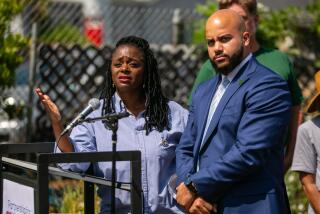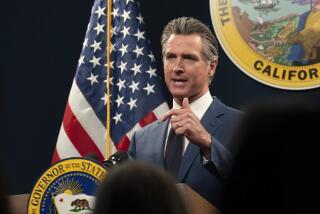McCarthy Sees Tax Load in Wilson Drug Plan
SACRAMENTO — A Republican calling for higher taxes?
That is exactly what Sen. Pete Wilson is doing, charges Lt. Gov. Leo T. McCarthy, his Democratic rival in the U.S. Senate race. McCarthy says Wilson’s latest proposal for curbing drug abuse would cost $5 billion in new taxes, including $500 million in California.
Speaking at a press conference here Tuesday, McCarthy referred to Wilson’s plan to require young people applying for drivers’ licenses to have their urine tested for drugs. Spokesmen for Wilson have said that the cost of the testing would be paid for by increasing drivers’ license fees. McCarthy is branding that fee a new tax.
While offering no figure of their own, the Wilson aides say that McCarthy’s $5-billion estimate of what the fee would amount to is much too high.
“It’s a little premature to talk about cost. But it would be way under what Leo is saying it would be,” said Bill Livingston, Wilson’s press secretary.
But McCarthy’s criticism extends further. He accuses Wilson of election-year grandstanding on the drug issue, of offering proposals of dubious value that cannot be paid for without raising taxes or shifting funds out of a defense budget that Wilson jealously guards.
Wilson has not been able to say how he would pay for his most ambitious proposal--a call for military assistance in drug interdiction that would give the military limited powers of arrest and cost about $300 million annually.
The nation’s deepening drug crisis is widely seen by Democrats as an opportunity to beat up on Republican incumbents. For McCarthy, it also offers an opportunity to rebut Wilson’s charge that the lieutenant governor has little credibility when it comes to fighting crime.
“Leo is trying to whitewash his abysmal record on crime and drug legislation with a new-found passion for law enforcement issues in an election year,” said Otto Bos, Wilson’s campaign manager.
Bos said he was alluding to McCarthy’s record of support of former California Chief Justice Rose Bird, his opposition to the state’s victim’s bill of rights law and his longtime opposition to the death penalty. (McCarthy is now an advocate of capital punishment.)
Bos also accused McCarthy of voting many times to liberalize drug laws while he was a member of the state Assembly and, until recently, of opposing the use of wiretapping by California law enforcement agencies. (Bos acknowledged that Wilson, while a member of the Assembly, also favored lessening penalties for first-time marijuana users.)
McCarthy recently announced several recommendations for combating drug crime. He would transfer $1 billion in 1989 from the budget for the Strategic Defense Initiative, the “Star Wars” space-based missile defense system, to federal and local law enforcement agencies. He would allow some of the assets seized in drug-related arrests to be used to pay for drug rehabilitation programs. Under current law, that money is either given to the police agency responsible for the arrest or held by the U.S. Justice Department. McCarthy also would require all school districts to provide drug education to elementary school children.
In several respects, however, McCarthy’s approach to the drug problem is not all that different from Wilson’s. He has come to support a bill in Congress, long championed by Wilson, that would require drug testing for airline pilots and railroad engineers and other transportation workers. Like Wilson, he favors a federal death penalty law for drug racketeers convicted of murder.
McCarthy ridicules Wilson’s call for economic sanctions against Mexico for not being cooperative enough in the war on drugs. “How can you call for a cut-off of aid to a country that is not getting any aid?” McCarthy said Tuesday.
More to Read
Get the L.A. Times Politics newsletter
Deeply reported insights into legislation, politics and policy from Sacramento, Washington and beyond. In your inbox three times per week.
You may occasionally receive promotional content from the Los Angeles Times.










